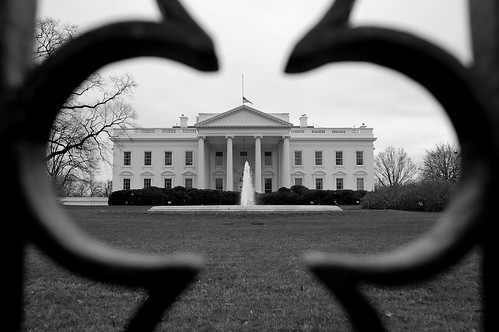 My Dad always used to say to me, "Tom", he'd say, "America is ungovernable." Dad's talking nonsense again I would think to myself, of course America is governable. I mean, it's being governed isn't it?
My Dad always used to say to me, "Tom", he'd say, "America is ungovernable." Dad's talking nonsense again I would think to myself, of course America is governable. I mean, it's being governed isn't it?
Now that I'm living here I can say: only barely. Dad was right, America is an incredibly difficult country to govern. Their three "separate but equal" branches of government, one of them split into two houses, and dominated by a two-party system at once rigid and chaotic, makes meaningful progress on difficult issues the exception rather than the rule, a product of circumstances which occur infrequently.
The Democratic and Republican parties dominate American politics to an even greater extent than any two parties in Australian, England, France, Germany or Canada. But they are generally, despite impressive Republican unity in opposing everything lately, a unruly bunch, and only periodically vote along party lines.
I have mixed feelings about this. On the one hand, I appreciate very much the greater diversity of opinion this allows. The health care debate has been a nightmare to watch up close but on the Democratic side at least there has been a robust debate about which model to pursue in what why. One the other hand, they couldn't get the bloody thing done.
It's been an amazing and dispiriting experience to observe (initially from afar, then up close) a seemingly-endless election campaign fought on a variety of issues, one of which was healthcare reform, and a landslide victory for the progressive in that election, only for the country to tear itself apart for a year following that election over the same issue they had been debating for the previous two years.
Despite my intense frustrations with the political dynamic in Australia when one party wins in a landslide campaigning on a set of policy reforms most of those reforms generally happen. Mandates are real. And if we hate these changes once implemented (or resent the delay in implementing them) we vote them out next time around. The cycle of (political) life. But here winning an election is no guarantee of anything. The president has only limited control over domestic policy - legislation must be introduced and passed in houses of Congress, and now, absurdly, both parties seem to accept the notion that it takes 60 votes in the Senate to get anything meaningful done.
Which is why America is generally ungovernable. Legislators put themselves above the parties. The process is unwieldy and prone to delay and obfuscation. The American political system seems designed to make it exceedingly hard to get difficult things done. It requires a rare combination of factors to allow changes on any scale to be affected, and it is beginning to look like the present moment, as hopeful as it seemed a year ago, might lack one or more of these factors.
Thinking back over the past 100 years of American history I can think of only two presidents who passed significant progressive domestic reforms: FDR with the establishment of the welfare state and LBJ with civil rights. (Clearly the fact BHO doesn't roll off the tongue is part of what is holding Obama back). In both cases there was a society under stress, from the Great Depression and the ructions of the 60's and assassination of Kennedy. In both cases America had significant external challengers, being at war or on the brink of war. In both cases there was passionate opposition from the right, who warned of ruin and socialism. So far so familiar. But also in both cases there was an equally-passionate and organized mass movement pushing from the left, advocating and demanding needed reforms. It's this last factor that is missing from Barack Obama's America.
This might be, in part, a product of the success of the Obama campaign itself. To an unprecedented degree it dominated the debate, monopolizing donations, volunteers and attention. This helped create a historic campaign but it also left the left wing groups outside government weaker than they would otherwise have been. Without an effective-enough or large-enough left flank to push him and perhaps more importantly the Congressional Democrats the perceived "center" of the health care debate has moved relentless rightwards, to the point where what eventually became a center-right reform is still being discussed as being "too far left."
Ironically success at campaigning has created a weakness for Obama in governing. Not that it was easy to begin with. It's not designed to be.

